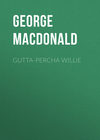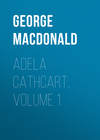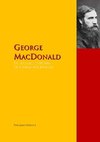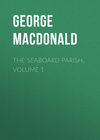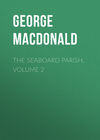Loe raamatut: «Alec Forbes of Howglen», lehekülg 11
CHAPTER XXIV
One afternoon, as Alec went home to dinner, he was considerably surprised to find Mr Malison leaning on one of the rails of the foot-bridge over the Glamour, looking down upon its frozen surface. There was nothing supernatural or alarming in this, seeing that, after school was over, Alec had run up the town to the saddler's, to get a new strap for one of his skates. What made the fact surprising was, that the scholars so seldom encountered the master anywhere except in school. Alec thought to pass, but the moment his foot was on the bridge the master lifted himself up, and faced round.
"Well, Alec," he said, "where have you been?"
"To get a new strap for my skatcher," answered Alec.
"You're fond of skating—are you, Alec?"
"Yes, sir."
"I used to be when I was a boy. Have you had your dinner?"
"No, sir."
"Then I suppose your mother has not dined, either?"
"She never does till I go home, sir."
"Then I won't intrude upon her. I did mean to call this afternoon."
"She will be very glad to see you, sir. Come and take a share of what there is."
"I think I had better not, Alec."
"Do, sir. I am sure she will make you welcome."
Mr Malison hesitated. Alec pressed him. He yielded; and they went along the road together.
I shall not have to show much more than half of Mr Malison's life—the school half, which, both inwardly and outwardly, was very different from the other. The moment he was out of the school, the moment, that is, that he ceased for the day to be responsible for the moral and intellectual condition of his turbulent subjects, the whole character—certainly the whole deportment—of the man changed. He was now as meek and gentle in speech and behaviour as any mother could have desired.
Nor was the change a hypocritical one. The master never interfered, or only upon the rarest occasions when pressure from without was brought to bear upon him, as in the case of Juno, with what the boys did out of school. He was glad enough to accept utter irresponsibility for that portion of his time; so that between the two parts of the day, as they passed through the life of the master, there was almost as little connection as between the waking and sleeping hours of a somnambulist.
But, as he leaned over the rail of the bridge, whither a rare impulse to movement had driven him, his thoughts had turned upon Alec Forbes and his antagonism. Out of school, he could not help feeling that the boy had not been very far wrong, however subversive of authority his behaviour had been; but it was not therefore the less mortifying to think how signally he had been discomfited by him. And he was compelled moreover to acknowledge to himself that it was a mercy that Alec was not the boy to follow up his advantage by heading—not a party against the master, but the whole school, which would have been ready enough to follow such a victorious leader. So there was but one way of setting matters right, as Mr Malison had generosity enough left in him to perceive; and that was, to make a friend of his adversary. Indeed there is that in the depths of every human breast which makes a reconciliation the only victory that can give true satisfaction. Nor was the master the only gainer by the resolve which thus arose in his mind the very moment before he felt Alec's tread upon the bridge.
They walked together to Howglen, talking kindly the whole way; to which talk, and most likely to which kindness between them, a little incident had contributed as well. Alec had that day rendered a passage of Virgil with a remarkable accuracy, greatly pleasing to the master, who, however, had no idea to what this isolated success was attributable. I forget the passage; but it had reference to the setting of sails, and Alec could not rest till he had satisfied himself about its meaning; for when we are once interested in anything, we want to see it nearer as often as it looms in sight. So he had with some difficulty cleared away the mists that clung about the words, till at length he beheld and understood the fact embodied in them.
Alec had never had praise from Mr Malison before—at least none that had made any impression on him—and he found it very sweet. And through the pleasure dawned the notion that perhaps he might be a scholar after all if he gave his mind to it. In this he was so far right: a fair scholar he might be, though a learned man he never could be, without developing an amount of will, and effecting a degree of self-conquest, sufficient for a Jesuit,—losing at the same time not only what he was especially made for knowing, but, in a great measure, what he was especially made for being. Few, however, are in danger of going so grievously against the intellectual impulses of their nature: far more are in danger of following them without earnestness, or if earnestly, then with the absorption of an eagerness only worldly.
Mrs Forbes, seeing the pleasure expressed on Alec's countenance, received Mr Malison with more than the usual cordiality, forgetting when he was present before her eyes what she had never failed to think of with bitterness when he was only present to her mind.
As soon as dinner was over Alec rushed off to the river, leaving his mother and the master together. Mrs Forbes brought out the whisky-bottle, and Mr Malison, mixing a tumbler of toddy, filled a wine-glass for his hostess.
"We'll make a man of Alec some day yet," said he, giving an ill-considered form to his thoughts.
"'Deed!" returned Mrs Forbes, irritated at the suggestion of any difficulty in the way of Alec's ultimate manhood, and perhaps glad of the opportunity of speaking her mind—"'Deed! Mr Malison, ye made a bonnie munsie (monsieur) o' him a month ago. It wad set ye weel to try yer hand at makin' a man o' him noo."
Had Alec been within hearing, he would never have let his mother forget this speech. For had not she, the immaculate, the reprover, fallen herself into the slough of the vernacular? The fact is, it is easier to speak the truth in a patois, for it lies nearer to the simple realities than a more conventional speech.
I do not however allow that the Scotch is a patois in the ordinary sense of the word. For had not Scotland a living literature, and that a high one, when England could produce none, or next to none—I mean in the fifteenth century? But old age, and the introduction of a more polished form of utterance, have given to the Scotch all the other advantages of a patois, in addition to its own directness and simplicity.
For a moment the dominie was taken aback, and sat reddening over his toddy, which, not daring even to taste it, he went on stirring with his toddy-ladle. For one of the disadvantages of a broken life is, that what a person may do with a kind of conscience in the one part, he feels compelled to blush for in the other. The despotism exercised in the school, even though exercised with a certain sense of justice and right, made the autocrat, out of school, cower before the parents of his helpless subjects. And this quailing of heart arose not merely from the operation of selfish feelings, but from a deliquium that fell upon his principles, in consequence of their sudden exposure to a more open atmosphere. But with a sudden perception that his only chance was to throw himself on the generosity of a woman, he said:
"Well, ma'am, if you had to keep seventy boys and girls quiet, and hear them their lessons at the same time, perhaps you would find yourself in danger of doing in haste what you might repent at leisure."
"Weel, weel, Mr Malison, we'll say nae mair aboot it. My laddie's nane the waur for't noo; and I hope ye will mak a man o' him some day, as ye say."
"He translated a passage of Virgil to-day in a manner that surprised me."
"Did he though? He's not a dunce, I know; and if it weren't for that stupid boat he and William Macwha are building, he might be made a scholar of, I shouldn't wonder. George should have more sense than encourage such a waste of time and money. He's always wanting something or other for the boat, and I confess I can't find in my heart to refuse him, for, whatever he may be at school, he's a good boy at home, Mr Malison."
But the schoolmaster did not reply at once, for a light had dawned upon him: this then was the secret of Alec's translation—a secret in good sooth worth his finding out. One can hardly believe that it should have been to the schoolmaster the first revelation of the fact that a practical interest is the strongest incitement to a theoretical acquaintance. But such was the case. He answered after a moment's pause—
"I suspect, ma'am, on the contrary, that the boat, of which I had heard nothing till now, was Alec's private tutor in the passage of Virgil to which I have referred."
"I don't understand you, Mr Malison."
"I mean, ma'am, that his interest in his boat made him take an interest in those lines about ships and their rigging. So the boat taught him to translate them."
"I see, I see."
"And that makes me doubt, ma'am, whether we shall be able to make him learn anything to good purpose that he does not take an interest in."
"Well, what do you think he is fit for, Mr Malison? I should like him to be able to be something else than a farmer, whatever he may settle down to at last."
Mrs Forbes thought, whether wisely or not, that as long as she was able to manage the farm, Alec might as well be otherwise employed. And she had ambition for her son as well. But the master was able to make no definite suggestion. Alec seemed to have no special qualification for any profession; for the mechanical and constructive faculties had alone reached a notable development in him as yet. So after a long talk, his mother and the schoolmaster had come no nearer than before to a determination of what he was fit for. The interview, however, restored a good understanding between them.
CHAPTER XXV
It was upon a Friday night that the frost finally broke up. A day of wintry rain followed, dreary and depressing. But the two boys, Alec Forbes and Willie Macwha, had a refuge from the ennui commonly attendant on such weather, in the prosecution of their boat-building. Hence it came to pass that in the early evening of the following Saturday, they found themselves in close consultation in George Macwha's shop, upon a doubtful point involved in the resumption of their labour. But they could not settle the matter without reference to the master of the mystery, George himself, and were, in the mean time, busy getting their tools in order—when he entered, in conversation with Thomas Crann the mason, who, his bodily labours being quite interrupted by the rain, had the more leisure apparently to bring his mental powers to bear upon the condition of his neighbours.
"It's a sod pity, George," he was saying as he entered, "that a man like you wadna, ance for a', tak thoucht a bit, and consider the en' o' a' thing that the sun shines upo'."
"Hoo do ye ken, Thamas, that I dinna tak thoucht?"
"Will ye say 'at ye div tak thoucht, George?"
"I'm a bit o' a Protestant, though I'm nae missionar; an' I'm no inclined to confess, Thamas—meanin' no ill-will to you for a' that, ye ken," added George, in a conciliatory tone.
"Weel, weel. I can only say that I hae seen no signs o' a savin' seriousness aboot ye, George. Ye're sair ta'en up wi' the warl'."
"Hoo mak' ye that oot? Ye big hooses, an' I mak' doors to them. And they'll baith stan' efter you an' me's laid i' the mouls.—It's weel kent forbye that ye hae a bit siller i' the bank, and I hae none."
"Not a bawbee hae I, George. I can pray for my daily breid wi' an honest hert; for gin the Lord dinna sen' 't, I hae nae bank to fa' back upo'."
"I'm sorry to hear 't, Thamas," said George.—"But Guid guide 's!" he exclaimed, "there's the twa laddies, hearkenin' to ilka word 'at we say!"
He hoped thus, but hoped in vain, to turn the current of the conversation.
"A' the better for that!" persisted Thomas. "They need to be remin't as well as you and me, that the fashion o' this warld passeth away. Alec, man, Willie, my lad, can ye big a boat to tak' ye ower the river o' Deith?—Na, ye'll no can do that. Ye maun gae through that watshod, I doobt! But there's an ark o' the Covenant that'll carry ye safe ower that and a waur flood to boot—and that's the flood o' God's wrath against evil-doers.—'Upon the wicked he shall rain fire and brimstone—a furious tempest.'—We had a gran' sermon upo' the ark o' the Covenant frae young Mr Mirky last Sabbath nicht. What for will na ye come and hear the Gospel for ance and awa' at least, George Macwha? Ye can sit i' my seat."
"I'm obleeged to ye," answered George; "but the muckle kirk does weel eneuch for me. And ye ken I'm precentor, noo, forbye."
"The muckle kirk!" repeated Thomas, in a tone of contempt. "What get ye there but the dry banes o' morality, upo' which the win' o' the word has never blawn to pit life into the puir disjaskit skeleton. Come ye to oor kirk, an' ye'll get a rousin', I can tell ye, man. Eh! man, gin ye war ance convertit, ye wad ken hoo to sing. It's no great singin' 'at ye guide."
Before the conversation had reached this point another listener had arrived: the blue eyes of Annie Anderson were fixed upon the speaker from over the half-door of the workshop. The drip from the thatch-eaves was dropping upon her shabby little shawl as she stood, but she was utterly heedless of it in the absorption of hearkening to Thomas Crann, who talked with authority, and a kind of hard eloquence of persuasion.
I ought to explain here that the muckle kirk meant the parish church; and that the religious community to which Thomas Crann belonged was one of the first results of the propagation of English Independency in Scotland. These Independents went commonly by the name of Missionars in all that district; a name arising apparently from the fact that they were the first in the neighbourhood to advocate the sending of missionaries to the heathen. The epithet was, however, always used with a considerable admixture of contempt.
"Are ye no gaein to get a minister o' yer ain, Thamas?" resumed George, after a pause, still wishing to turn the cart-wheels of the conversation out of the deep ruts in which the stiff-necked Thomas seemed determined to keep them moving.
"Na; we'll bide a bit, and try the speerits. We're no like you—forced to lat ower (swallow) ony jabble o' lukewarm water that's been stan'in' i' the sun frae year's en' to year's en', jist because the p tron pleases to stick a pump intil 't an' ca' 't a well o' salvation. We'll ken whaur the water comes frae. We'll taste them a', and cheese accordin'."
"Weel, I wadna like the trouble nor yet the responsibility."
"I daursay not."
"Na. Nor yet the shame o' pretennin' to jeedge my betters," added
George, now a little nettled, as was generally the result at last of
Thomas's sarcastic tone.
"George," said Thomas solemnly, "nane but them that has the speerit can ken the speerit."
With these words, he turned and strode slowly and gloomily out of the shop—no doubt from dissatisfaction with the result of his attempt.
Who does not see that Thomas had a hold of something to which George was altogether a stranger? Surely it is something more to stand with Moses upon Mount Sinai, and see the back of God through ever so many folds of cloudy darkness, than be sitting down to eat and drink, or rising up to play about the golden calf, at the foot of the mountain. And that Thomas was possessed of some divine secret, the heart of child Annie was perfectly convinced; the tone of his utterance having a greater share in producing this conviction than anything he had said. As he passed out, she looked up reverently at him, as one to whom deep things lay open, Thomas had a kind of gruff gentleness towards children which they found very attractive; and this meek maiden he could not threaten with the vials of wrath. He laid his hard heavy hand kindly on her head, saying:
"Ye'll be ane o' the Lord's lambs, will ye no? Ye'll gang into the fold efter him, will ye no?"
"Ay will I," answered Annie, "gin He'll lat in Alec and Curly too."
"Ye maun mak nae bargains wi' him; but gin they'll gang in, he'll no haud them oot."
And away, somewhat comforted, the honest stonemason strode, through the darkness and the rain, to his own rather cheerless home, where he had neither wife nor child to welcome him. An elderly woman took care of his house, whose habitual attitude towards him was one half of awe and half of resistance. The moment he entered, she left the room where she had been sitting, without a word of welcome, and betook herself to the kitchen, where she prepared his plate of porridge or bowl of brose. With this in one hand, and a jug of milk in the other, she soon returned, placing them like a peace-offering on the table before him. Having completed the arrangement by the addition of a horn spoon from a cupboard in the wall, she again retired in silence. The moment she vanished Thomas's blue bonnet was thrown into a corner, and with folded hands and bent head he prayed a silent prayer over his homely meal.
By this time Alec and Curly, having received sufficient instruction from George Macwha, were in full swing with their boat-building. But the moment Thomas went, Alec, had taken Annie to the forge to get her well-dried, before he would allow her to occupy her old place in the heap of spales.
"Wha's preachin' at the missionar-kirk the morn, Willie?" asked the boy's father, For Willie knew everything that took place in Glamerton.
"Mr Broon," answered Curly.
"He's a guid man that, ony gait," returned his father. "There's nae mony like him. I think I'll turn missionar mysel', for ance and awa', and gang and hear him the morn's nicht."
At the same instant Annie entered the shop, her face glowing with the heat of the forge and the pleasure of rejoining her friends. Her appearance turned the current, and no more was said about the missionar-kirk.—Many minutes did not pass before she had begun to repeat to the eager listeners one of the two new poems which she had got ready for them from the book Miss Cowie had lent her.
CHAPTER XXVI
Whatever effect the remonstrances of Thomas might or might not have upon the rest, Annie had heard enough to make her want to go to the missionar-kirk. For was it not plain that Thomas Crann knew something that she did not know? and where could he have learned it but at the said kirk? There must be something going on there worth looking into. Perhaps there she might learn just what she needed to know; for, happy as she was, she would have been much happier had it not been for a something—she could neither describe nor understand it—which always rose between her and the happiness. She did not lay the blame on circumstances, though they might well, in her case, have borne a part of it. Whatever was, to her was right; and she never dreamed of rebelling against her position. For she was one of those simple creatures who perceive at once that if they are to set anything right for themselves or other people, they must begin with their own selves, their inward being and life. So without knowing that George Macwha intended to be there, with no expectation of seeing Alec or Curly, and without having consulted any of the Bruce family, she found herself, a few minutes after the service had commenced, timidly peering through the inner door of the chapel, and starting back, with mingled shyness and awe, from the wide solemnity of the place. Every eye seemed to have darted upon her the moment she made a chink of light between the door and its post. How spiritually does every child-nature feel the solemnity of the place where people, of whatever belief or whatever intellectual rank, meet to worship God! The air of the temple belongs to the poorest meeting-room as much as to the grandest cathedral. And what added to the effect on Annie was, that the reputation of Mr Brown having drawn a great congregation to hear him preach that evening, she, peeping through the door, saw nothing but live faces; whereas Mr Cowie's church, to which she was in the habit of going, though much larger, was only so much the more empty. She withdrew in dismay to go up into the gallery, where, entering from behind, she would see fewer faces, and might creep unperceived into the shelter of a pew; for she felt "little better than one of the wicked" in having arrived late. So she stole up the awful stair and into the wide gallery, as a chidden dog might steal across the room to creep under the master's table. Not daring to look up, she went with noiseless difficulty down a steep step or two, and perched herself timidly on the edge of a seat, beside an old lady, who had kindly made room for her. When she ventured to lift her eyes, she found herself in the middle of a sea of heads. But she saw in the same glance that no one was taking any notice of her, which discovery acted wonderfully as a restorative. The minister was reading, in a solemn voice, a terrible chapter of denunciation out of the prophet Isaiah, and Annie was soon seized with a deep listening awe. The severity of the chapter was, however, considerably mollified by the gentleness of the old lady, who put into her hand a Bible, smelling sweetly of dried starry leaves and southernwood, in which Annie followed the reading word for word, feeling sadly condemned if she happened to allow her eyes to wander for a single moment from the book. After the long prayer, during which they all stood—a posture certainly more reverential than the sitting which so commonly passes for kneeling—and the long psalm, during which they all sat, the sermon began; and again for a moment Annie ventured to look up, feeling protected from behind by the back of the pew, which reached high above her head. Before her she saw no face but that of the minister, between which and her, beyond the front of the gallery, lay a gulfy space, where, down in the bottom, sat other listening souls, with upturned faces and eyes, unseen of Annie, all their regards converging upon the countenance of the minister. He was a thin-faced cadaverous man, with a self-severe saintly look, one to whom religion was clearly a reality, though not so clearly a gladness, one whose opinions vague half-monstrous embodiments of truth—helped to give him a consciousness of the life which sprung from a source far deeper than his consciousness could reach. I wonder if one will ever be able to understand the worship of his childhood—that revering upward look which must have been founded on a reality, however much after experience may have shown the supposed grounds of reverence to be untenable. The moment Annie looked in the face of Mr Brown, she submitted absolutely; she enshrined him and worshipped him with an awful reverence. Nor to the end of her days did she lose this feeling towards him. True, she came to see that he was a man of ordinary stature, and that some of the religious views which he held in common with his brethren were dishonouring of God, and therefore could not be elevating to the creature. But when she saw these and other like facts, they gave her no shock—they left the reflex of the man in her mind still unspotted, unimpaired. How could this be? Simply because they left unaltered the conviction that this man believed in God, and that the desire of his own heart brought him into some real, however undefinable, relation to him who was yet nearer to him than that desire itself, and whose presence had caused its birth.
He chose for his text these words of the Psalmist: "The wicked shall be turned into hell, and all the nations that forget God." His sermon was less ponderous in construction and multitudinous in division than usual; for it consisted simply of answers to the two questions: "Who are the wicked?" and "What is their fate?" The answer to the former question was, "The wicked are those that forget God;" the answer to the latter, "The torments of everlasting fire." Upon Annie the sermon produced the immediate conviction that she was one of the wicked, and that she was in danger of hell-fire. The distress generated by the earlier part of the sermon, however, like that occasioned by the chapter of prophecy, was considerably mitigated by the kindness of an unknown hand, which, appearing occasionally over her shoulder from behind, kept up a counteractive ministration of peppermint lozenges. But the representations grew so much in horror as the sermon approached its end, that, when at last it was over, and Annie drew one long breath of exhaustion, hardly of relief, she became aware that the peppermint lozenge which had been given her a quarter of an hour before, was lying still undissolved in her mouth.
What had added considerably to the effect of the preacher's words, was that, in the middle of the sermon, she had, all at once, caught sight of the face of George Macwha diagonally opposite to her, his eyes looking like ears with the intensity of his listening. Nor did the rather comical episode of the snuffing of the candles in the least interfere with the solemnity of the tragic whole. The gallery was lighted by three coron of tallow candles, which, persisting in growing long-nosed and dim-sighted, had, at varying periods, according as the necessity revealed itself to a certain half-witted individual of the congregation, to be snodded laboriously. Without losing a word that the preacher uttered, Annie watched the process intently. What made it ludicrous was, that the man, having taken up his weapon with the air of a pious executioner, and having tipped the chandelier towards him, began, from the operation of some occult sympathy, to open the snuffers and his own mouth simultaneously; and by the time the black devouring jaws of the snuffers had reached their full stretch, his own jaws had become something dragonlike and hideous to behold—when both shut with a convulsive snap. Add to this that he was long-sighted and often missed a candle several times before he succeeded in snuffing it, whereupon the whole of the opening and shutting process had to be repeated, sometimes with no other result than that of snuffing the candle out, which had then to be pulled from its socket and applied to the next for re-illumination. But nothing could be farther from Annie's mood than a laugh or even a smile, though she gazed as if she were fascinated by the snuffers, which were dreadfully like one of the demons in a wood-cut of the Valley of the Shadow of Death in the Pilgrim's Progress without boards, which had belonged to her father.
When all had ceased—when the prayer, the singing, and the final benediction were over, Annie crept out into the dark street as if into the Outer Darkness. She felt the rain falling upon something hot, but she hardly knew that it was her own cheeks that were being wetted by the heavy drops. Her first impulse was to run to Alec and Curly, put her arms about their necks, and entreat them to flee from the wrath to come. But she could not find them to-night. She must go home. For herself she was not much afraid; for there was a place where prayer was heard as certainly as at the mercy-seat of old—a little garret room namely, with holes in the floor, out of which came rats; but with a door as well, in at which came the prayed-for cat.
But alas for poor Annie and her chapel-going! As she was creeping slowly up from step to step in the dark, the feeling came over her that it was no longer against rats, nor yet against evil things dwelling in the holes and corners of a neglected human world, that she had to pray. A spiritual terror was seated on the throne of the universe, and was called God—and to whom should she pray against it? Amidst the darkness, a deeper darkness fell.
She knelt by her bedside, but she could not lift up her heart; for was she not one of them that forget God? and was she not therefore wicked? and was not God angry with her every day? Was not the fact that she could not pray a certain proof that she was out of God's favour, and counted unworthy of his notice?
But there was Jesus Christ: she would cry to him. But did she believe in him? She tried hard to convince herself that she did; but at last she laid her weary head on the bed, and groaned in her young despair. At the moment a rustling in the darkness broke the sad silence with a throb of terror. She started to her feet. She was exposed to all the rats in the universe now, for God was angry with her, and she could not pray. With a stifled scream she darted to the door, and half tumbled down the stair in an agony of fear.
"What gars ye mak sic a din i' the hoose o' the Sawbath nicht?" screamed Mrs Bruce.
But little did Annie feel the reproof. And as little did she know that the dreaded rats had this time been the messengers of God to drive her from a path in which lies madness.
She was forced at length to go to bed, where God made her sleep and forget him, and the rats did not come near her again that night.
Curly and Alec had been in the chapel too, but they were not of a temperament to be disturbed by Mr Brown's discourse.











